The Salzburg Festival started on Friday. One of the highlights of the opening celebrations (which are going on this weekend) is the Salzburger Fackeltanz (torch dance): some 100 dancers dance around the Residenzbrunnen fountain with flaming torches.
There is something magical about the figures and shapes the torches trace in the darkness, the baroque fountain and the buildings on Residenzplatz as background.
Five weeks of opera, theatre, VIPs, overpriced cappuccini in coffee houses and roaring members of the Audi on stage fleet driving around like crazy. Welcome to Salzburg in summer!
Sunday, 29 July 2007
Groundhog Event: Opening of the Salzburg Festival
Saturday, 21 July 2007
About time and clocks
I am often asked questions that I don't really know how to answer. For example, when I explained that we went swimming to a lake last weekend, I was asked about the water temperature. I said that it was a little cold for me, but they were asking about the actual temperature, in degrees. I learned afterwards that water temperature is normally displayed in public baths, and Austrians seem to be obsessed with it. Is it that important? Especially when we are talking about 19ºC or 21ºC. What a difference do 2ºC make? Does our skin really have the resolution of a thermometer?
One of the facts that still astonishes me about Austria is the concept of time. If the bus should come at, say, 07:21 and it's already 07:23 and it has not come yet, you'll start to see angry faces who look at clocks with exasperation and shake heads. Even if the bus actually comes at 07:24, chances are high that someone will complain to the bus driver. Sie nehmen von uns Zeit! (You are taking time from us!).
Time seems to be really important. I can understand it when you are going to work, because you don't want to be late. No problem. But the same happens when they go home after work. Time you are commuting is lost, seems to be the idea. They seem to be in a hurry and would rather take the car (or the train, or the bus) if it saves 3 minutes (3 minutes!!!) on the way back home. I don't understand that. Is it maybe because they still have something important to do? Not really, most of them just want the time for themselves, to sit around on the couch drinking a beer and watch TV. So, do really that 3 minutes make a difference? Why do they always seem to be in such a hurry? More importantly, why do they keep pushing my butt with their trolleys on the supermarket queue? :)
Even when you want to meet a friend, you say Hast du Zeit am Samstag? (Do you have time on Saturday?). Time is a very important resource here, and the question Do you have time? puts the stress exactly on this resource. Are you willing to spend your precious resource time meeting me? The expression to spend time is significant as well. Time is spent as if it were money.
I can't imagine myself saying ¿Tienes tiempo el sábado? to a Spanish friend of mine. I would say ¿Quedamos el sábado? (Shall we meet on Saturday?). The stress is not on the resource time, but in the fact that I want to meet you. I think the language that we speak is shaped by the way we think. You will have heard the word Zeit quite often at the end of the day here.
I guess it's because I come from a southern country that I'm surprised. Because, you know, time is not that important there. And I would say that Austria is just in the middle, I guess (I heard) it keeps getting worse as you go up north.
I met once a sahrawi girl, who told me that the desert people have a very wise saying: You Europeans may have the clocks. We have the time.
Wednesday, 18 July 2007
Finite Simple Group (of Order Two)
I am a mathematician, I think I already mentioned that. As such, I enjoy the occasional mathematical joke, although I know that's definitely not what you want to use when it comes to boost up your social life. One of my all-time favourites is "What's a polar bear? It's a Cartesian bear after a coordinate change." :)
However, I recently discovered The Klein Four Group, one of the first a cappella groups of the world of higher mathematics. Five graduate students of the Northwestern University in Evanston/Chicago, IL, sing about life with implicit references to mathematical topics. They may be seen as a bunch of nerds who know how to sing, and they probably are, but I think they sing great!
I don't really like embedded YouTube videos in blogs, but I will make an exception for them today. Let me introduce you The Klein Four Group with their hit Finite Simple Group (of Order Two) (here the lyrics)
The name of the group itself is a pun to this. I hope I didn't scare half of my readers away! Please don't panic, I won't be posting mathematical jokes any more... :)
Friday, 13 July 2007
Lizard! Lizard! (*)
 I learned a new word today: paraskavedekatriaphobia. It derives from a concatenation of the Greek words Παρασκευή, δεκατρείς, and φοβία, meaning Friday, thirteen, and phobia respectively. It is quite a pedantic way to refer to the fear of Friday the 13th.
I learned a new word today: paraskavedekatriaphobia. It derives from a concatenation of the Greek words Παρασκευή, δεκατρείς, and φοβία, meaning Friday, thirteen, and phobia respectively. It is quite a pedantic way to refer to the fear of Friday the 13th.
A Friday occurring on the thirteenth day of any month is considered to be a day of bad luck. But not everywhere, just in English, German, Polish and Portuguese-speaking countries. In Spain (in Greece too) it is Tuesday the 13th, and not Friday, who takes this role. There is even a Spanish saying about it: "Martes y trece, ni te cases ni te embarques" ("Tuesday the 13th, neither marry nor embark"), which is quite stupid, because it doesn't even rhyme!
I read today that this superstitious belief is not really old. In fact, the first written references are as recent as 1950. Or, at least, that's the point of GWUP, Gesellschaft zur wissenschaftlichen Untersuchung von Parawissenschaften e.V., Society for the Scientific Investigation of Parascience (I'm sorry, it's only in German!, but here there is something about it as well). And that might be an explanation why Spain is (once again) different. In 1950 Spain was already under Franco's dictatorship, and especially on its first half (until the 70's), there was a strong tendency to isolation from the rest of the world. Which could well had affected these kind of fairy tales as well.
How was this Friday the 13th for you?
(*) "Lagarto! Lagarto!" (Lizard! Lizard!) is a typical Spanish spell to scare evil spirits away.
Monday, 9 July 2007
The Eagles are coming!
We went yesterday to Burg Hohenwerfen. It is a fortress located south of Salzburg, on top of a cliff dominating the pass through the Paß Lueg, one of the dramatic gorges of the Salzach river. Every time I see such a castle (Festung Hohensalzburg in Salzburg is a good example, too) I try to imagine how it would be to have to defend or to have to attack it.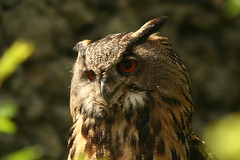
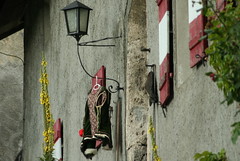
Hohenwerfen is site to a research center for raptors and birds of prey. In addition, they make use of the incomparable environment to dress in medieval clothing and stage a superb bird show. Two hawks, three eagles, a vulture and two red kites flew over (and sometimes between!) our heads. Hands on EduDigis and her long lens, we honored the National Geographic photographer that everyone has inside.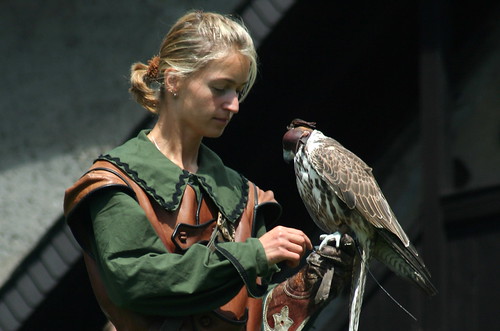
I am posting here some photographs of the event. Looking at their weightless flight abilities, I find myself out of words. I know I shot too many photos, but I think it's worth it.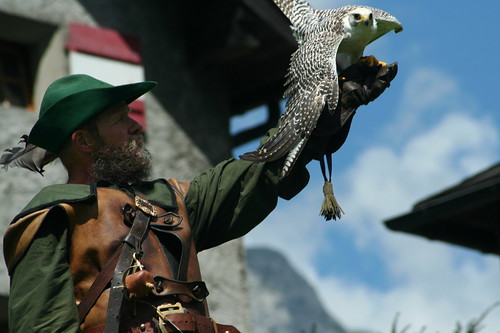
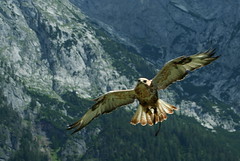

The hawk flies at an incredible speed and almost touching the ground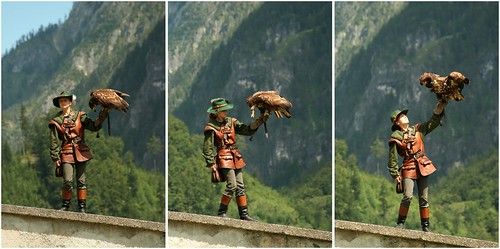
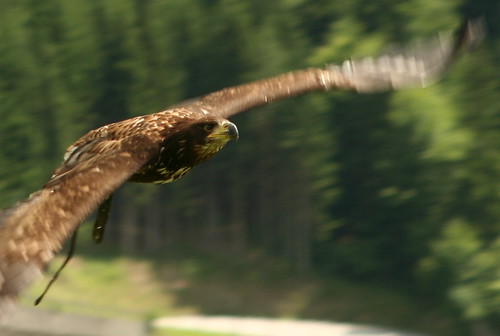
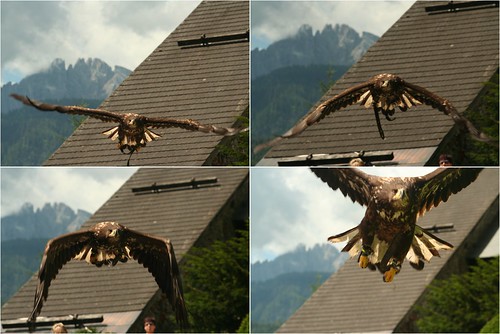
An eagle flying. What else can I say?
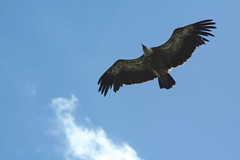
The vulture's flight is mighty, strong, like slow-motion.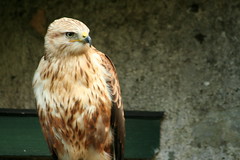
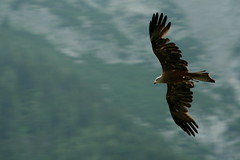
Is it National Geographic tune what I seem to hear? :)
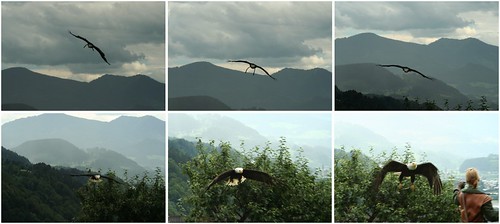

The white eagle is without a doubt the most elegant bird on the show.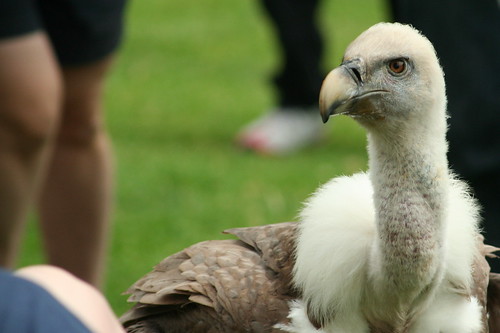
This vulture wanted to be friends with us... I hope!
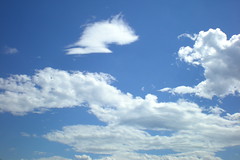
Wish I had wings to fly away with them...
Friday, 6 July 2007
Shooting the air
Yesterday we learnt that Salzburg will not host the Winter Olympic Games in 2014. It has been the third time in a row that Salzburg is candidate city (2006, 2010 and now 2014), and it has never been elected.
I read the newspaper (Salzburger Nachrichten, "Salzburg News") every morning in the bus on my way to the office. I liked its cover picture yesterday. The Austrian chancellor, Alfred Gusenbauer, hugs the mayor of Salzburg, Heinz Schaden, just after learning that the Olympic dream is over after the first voting. Schaden's face doesn't need any extra explanation, you don't have to read the headline to understand what happened. I had the photo in mind as I was reading the news, and maybe because of some naturally human empathy, I felt sorry about the poor man.
It is one of those pictures about catching the moment, being there, guessing what's about to happen, with the framing chosen, the light measured, the right white balance set... It's a pity that I haven't been able to find an online version of the picture (so far). But I will show you a couple flying coffeepots in exchange... :)
I am amazed at this ability that pictures have to evoke something. Because the feelings are there, within the four edges of the picture. And you feel them, but you don't really know how. Pictures are a language, same thing as those spoken or written, but we don't learn to "read" images at school. We can interpret them, but we do it in an unconscious way, almost visceral. And that's precisely what makes images so mighty and at the same time so dangerous as a way to communicate.
As I started being a hobby photographer I felt myself lost quite often. Sometimes, out of luck and not out of skills, I made a photograph that I liked very much. But I wasn't able to say why this one, or what was wrong with the others. In fact it still happens to me. But photography is a language, and as all languages, possesses some basic rules that let us interpret them, and provide us with the ability to make others understand what we meant.
One of these basic rules is that even though it is transparent, it is very important to photograph the air. When we look at a picture, we put ourselves in the viewpoint of the camera. But a camera is not like our eyes. We see a lot more, our field of view is wider, with high resolution in the middle that decays to the outside. Our brain completes shapes, balances colours, interprets textures, reconstructs volumes. A camera cannot do all that.
The air is the medium in which we move, we live, we breathe. We take it for granted, and there is air everywhere we look. It is so familiar that we do not even realise. But when we see no air, we notice it immediately. Probably we don't know what's wrong, but we definitely know something is wrong. The same happens with a photograph. If there is air it feels familiar, nice, natural. When there is no air, we have a funny feeling that we choke and we don't know why.
Monday, 2 July 2007
The hills are alive
We went hiking yesterday. Last week we learnt about the kumm auffi event in Filzmoos. The most interesting highlight are couches and armchairs on top of the mountain, as a sign of coziness. A living room by an alpine lake ("das Wohnzimmer am Almsee"). We found it a great idea, and a loop hiking trail of about 15 minutes turned out to be the perfect activity for my light hangover after having had some drinks with friends on Saturday night.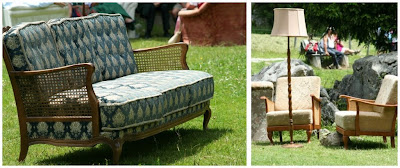
As we were hanging out in this wonderful living room, eating our sandwiches with an Almdudler, some people started singing popular Austrian songs. Or at least I guess they were, because other people joined them, something that was happily welcome by the singers ("nicht nur zuhören, mitsingen!" - "don't just listen to, sing along!"). They were probably a choir, as they sang in several voices. The dramatic landscape, the mountains, the traditional costumes, ... it was just as if the von Trapp family was about to appear any moment!
Tradition is very important to Austrians. One of the most representative examples are the costumes. You just need to walk around on a Sunday and you will see many locals in Lederhosen (men) and Dirndl (women), which are the traditional costumes of Alpine peasants. It doesn't really need to be Sunday: you might find them everywhere and anytime. People get married in them, especially on the countryside. We got a little lost once while driving along a narrow road that got suddenly blocked by an Austrian wedding: some 50 guests, all dressed up in lederhosen and dirndl, pointing at us and saying "Oh! Espania! Espania!" (yes, we still had our Spanish license plates on the car then).
Sometimes I feel a little envious of them. Because they have been able to keep their customs in a way that I can't imagine in Spain. Where most of the traditions have been monopolised along History by certain political views. Where saying Spain is your homeland constitutes already a political option.
There is something wonderful in the contrast between an old couple dressed in traditional costumes, a youngster with the skater look as-seen-on-MTV, an Indonesian tourist taking photos and a Muslim woman hurrying up to cook dinner for her family. I cannot avoid idealist thoughts about brotherhood among all peoples in the world. Sadly, not everyone shares this vision: some people (here, there, everywhere) do not approve the others' traditions, and they hold even stronger to their ones. A minaret in the heart of an Alpine valley? No way, it doesn't belong to it! What do they look for in here? They are not willing to integrate themselves. We must defend ourselves. They build ghettos. We don't want them here. They. We.
I was once in the bus, coming back home. An old man was sitting near me. An immigrant, probably from the Middle East, tired, with a subtle but indelible sadness in his dark wise eyes. A young Muslim girl got into the bus. She was pretty and had her hair covered by a headscarf. She greeted the man kindly, sat next to him and started talking. He articulated with a little difficulty. She wielded a graceful Austrian dialect. Both were talking German. After some five minutes in which I listened to fascinated, the bus stopped and the girl stepped out. She bid him farewell with "Servus! Salaam aleikum!". I was almost moved to tears.

 versión en español
versión en español






